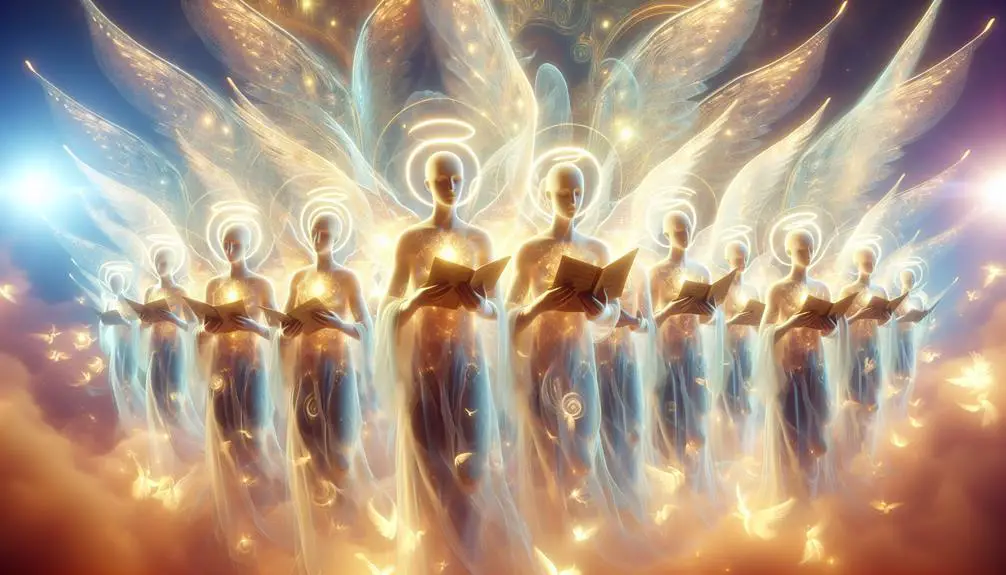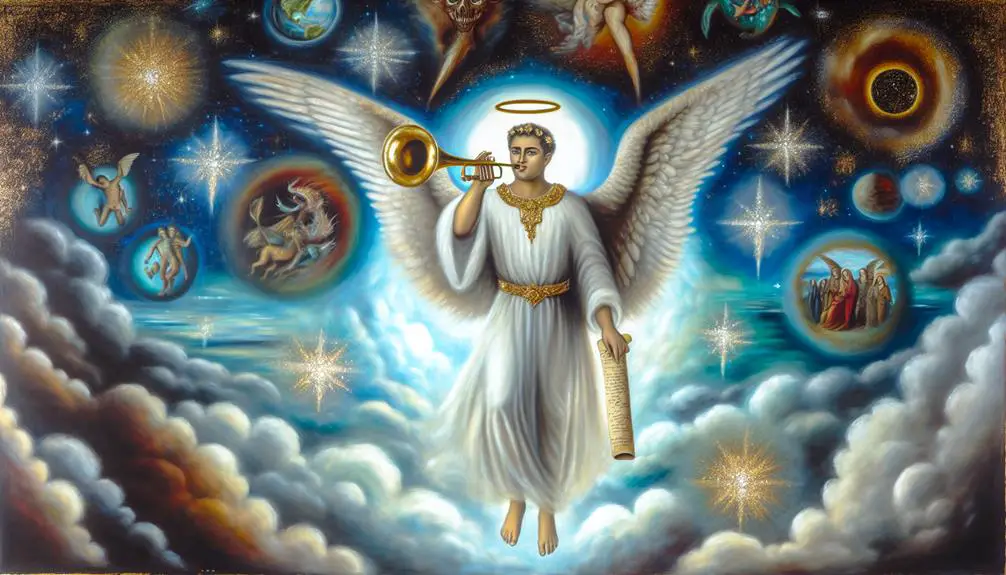Discover the roles of messenger angels in biblical narratives, and explore the divine connection they offer between heaven and earth.

Messenger Angels in the Bible
In the tapestry of biblical narratives, messenger angels are the threads that weave together divine messages with human experience. You've likely encountered the stories of the Angel Gabriel announcing the birth of Jesus, or angels guiding prophets and providing protection.
These celestial beings play pivotal roles, acting as bridges between heaven and earth. As you explore this topic, consider the implications of these divine messengers not just in ancient texts, but in the continuity they bring to modern spiritual experiences.
What might their presence in scripture suggest about the nature of communication between the divine and the mortal?
Key Takeaways
- Messenger angels serve as divine intermediaries, delivering critical messages from God to humans.
- Angel Gabriel's announcements to figures like Daniel, Zechariah, and Mary have significantly altered the course of human history.
- Protective and guardian angels play vital roles in ensuring safety, guiding, and conveying divine messages to individuals.
- Angels have a profound impact on theological narratives, bridging the gap between the divine and mortal realms and influencing prophets' missions.
The Role of Messenger Angels

In examining the role of messenger angels, it's evident that they serve as divine intermediaries, conveying critical messages from the divine realm to humanity. These heavenly emissaries are pivotal in bridging the gap between the celestial and the terrestrial, ensuring that angelic messages reach those who are meant to receive them. Their presence in biblical texts isn't merely ornamental; it's fundamental to understanding how divine will and guidance are communicated to humans.
Messenger angels, as depicted in various scriptures, aren't autonomous entities acting on their whims. Instead, they follow a divine mandate, delivering messages that often contain guidance, warnings, or revelations. These angelic messages serve multiple purposes: they can alter the course of events, provide comfort during tumultuous times, or even herald significant changes.
The function of these heavenly emissaries underscores a complex theological framework within which divine communication operates. It's a testament to the interconnectedness of the spiritual and earthly realms, where celestial beings play a crucial role in the unfolding of human history. Through their interventions, messenger angels exemplify how divine messages are intricately woven into the fabric of human experiences, guiding, warning, and sometimes, transforming lives.
Angel Gabriel's Announcements
Among the most pivotal announcements in the biblical narrative, those made by the Angel Gabriel stand as profound demonstrations of the divine's direct intervention in human affairs. Gabriel's messages, delivered with precision and authority, were not merely news but divine proclamations that set the course of human history in a new direction. Each announcement carried with it a profound impact, challenging the recipients' faith, understanding, and willingness to participate in God's plan.
Recipient |
Gabriel's Message |
Announcement Impact |
|---|---|---|
Daniel |
Prophecy of the Seventy Weeks |
Offered insight into God's timeline for redemption |
Zechariah |
Birth of John the Baptist |
Signaled the beginning of the fulfillment of prophecy |
Mary |
Birth of Jesus |
Announced the incarnation of God, altering human history |
Shepherds |
Birth of Jesus |
Spread the news of the Messiah to the marginalized |
Joseph |
Mary's Pregnancy |
Reassured divine intervention and protection |
These announcements showcase Gabriel's role as a messenger of pivotal news, directly impacting the biblical narrative's trajectory. Each message served as a catalyst for change, illustrating the interconnectedness of divine messages and their profound effects on human history and individual lives.
Angels in the Life of Jesus

Exploring further, the narrative unfolds to reveal the significant roles angels played throughout the life of Jesus, from his birth to the resurrection. The Nativity scene, a pivotal event, demonstrates the integral part angels assumed, heralding Jesus' arrival to shepherds and guiding the Magi. This moment underscores the celestial beings' role in signaling a divine intervention in human history.
As Jesus matured and embarked on his ministry, angels continued to provide support, most notably during the Temptation. After enduring 40 days in the wilderness, facing Satan's challenges, angels ministered to Jesus, offering him comfort and strength. This instance illustrates the spiritual sustenance angels provided, ensuring Jesus' readiness for his earthly mission.
Angels' involvement didn't cease with Jesus' ministry. Following his crucifixion, it was an angel who rolled away the stone from his tomb and announced the resurrection to the women who arrived early at the scene. This act of revealing Jesus' victory over death not only affirmed the divine plan but also highlighted angels' critical role in God's work of salvation. Their presence throughout Jesus' life encapsulates the profound connection between the divine and humanity, manifesting God's ongoing communication and intervention in the world.
Protective Angels in the Bible
You'll find that the Bible intricately details the roles of protective angels, illustrating their divine mandate to guard and guide.
These celestial beings are depicted as shields for biblical figures, intervening in human affairs to provide safety and convey messages from the divine.
Exploring encounters with these protective spirits offers profound insights into their significance within the biblical narrative, highlighting their role in the spiritual ecosystem.
Guardian Angels' Divine Role
Throughout biblical scripture, guardian angels serve a pivotal role as divine protectors, shielding individuals from harm and guiding them through perilous situations. Embedded within the angelic hierarchy, these celestial beings navigate the complex terrain of spiritual warfare, intervening in the physical realm to ensure the safety and spiritual well-being of those they're assigned to.
Their tasks aren't merely acts of physical safeguarding but also involve battling unseen forces that seek to disrupt or derail one's spiritual journey. This divine role underscores a profound theological concept: the intersection of divine providence with human affairs, where guardian angels act as emissaries of God's protective grace.
Their presence signifies a deeper layer of spiritual guardianship, woven intricately into the fabric of biblical teachings on divine protection and care.
Angels Shielding Biblical Figures
Building on the understanding of guardian angels' divine roles, let's examine specific instances where angels provided protection to biblical figures, highlighting the profound impact of these celestial interventions on the course of biblical narratives. Angel interventions served not merely as acts of rescue but as divine escorts guiding and shielding figures from harm.
These narratives underscore the belief that angels aren't just messengers but also protectors, assigned by a higher power to ensure the safety and fulfillment of divine plans. By analyzing these instances, we gain insight into the intricate ways divine protection is woven into the fabric of biblical stories, illustrating the depth of the relationship between the divine and humanity.
These protective angels underscore the notion of a vigilant, caring cosmos, orchestrated by divine will.
Encounters With Protective Spirits
In the tapestry of biblical narratives, protective angels emerge as pivotal figures, orchestrating divine interventions that safeguard the chosen from perilous fates. These celestial beings serve as agents of celestial guidance, steering individuals away from harm and towards their divine destinies.
Spiritual encounters with these protective spirits underscore a recurrent theme of divine watchfulness and intervention. Through their actions, the Bible conveys a profound message: you're never alone in your struggles, and divine assistance is always at hand, albeit in forms that mightn't always be immediately recognizable.
These narratives teach you about the power of faith and the presence of an omnipresent protector, guiding you through the unseen dangers of the world with a steady, invisible hand.
Angels and the Prophets
Angels frequently served as divine messengers to the prophets, exemplifying a unique bridge between the divine will and human understanding. They played pivotal roles, not only delivering messages but also interpreting prophetic dreams. This interaction between angels and prophets underscores the profound ways in which angelic interpretations were integral to the unfolding of divine plans.
The table below outlines key instances where angels interacted with prophets, highlighting their roles in delivering messages and interpreting dreams:
Prophet |
Angelic Role |
Outcome |
|---|---|---|
Daniel |
Interpretation of dreams |
Guided understanding of visions |
Elijah |
Provision and guidance |
Strength and direction |
Isaiah |
Commissioning |
Prophetic mission affirmed |
Zechariah |
Communication of future events |
Insight into divine plans |
Joseph (NT) |
Clarification of prophetic dreams |
Assurance and direction |
These encounters reveal a nuanced relationship between the prophets and their celestial visitors. Angels didn't just passively relay messages; they actively engaged with the prophets, providing interpretations that were crucial for the prophet's mission. This dynamic interaction highlights the multifaceted roles of angels as both messengers and interpreters, bridging the gap between the divine and the mortal realms.
Visions of Angels in Revelation

The Book of Revelation showcases a complex tapestry of angelic visions, each intricately woven into the narrative to elucidate the unfolding divine drama. You'll find that celestial imagery and apocalyptic messengers are central to its structure, serving not just as background characters but as pivotal figures delivering God's messages and executing divine judgments.
As you delve deeper, you'll notice that these angels aren't merely symbolic; they're dynamic agents of change. Their appearances are rich with symbolism, each detail purposefully designed to convey specific aspects of God's plan for humanity and the cosmos. This celestial imagery is potent, drawing on a wealth of biblical and extrabiblical traditions to craft scenes that are both awe-inspiring and deeply meaningful.
Moreover, the role of apocalyptic messengers in Revelation is profound. They're tasked with revealing truths that are both comforting and terrifying, depending on one's spiritual standing. Through them, Revelation paints a vivid picture of the cosmic battle between good and evil, and the ultimate triumph of God's kingdom.
In essence, these visions of angels in Revelation aren't just narrative flourishes. They're theological statements, crafted to challenge, inspire, and ultimately, transform the reader's understanding of the divine narrative.
Encounters With Angels Today
Exploring contemporary encounters, it's evident that many people claim to have experienced interactions with angels, suggesting a continuity of these celestial messengers' roles into the present day. Despite the prevalence of angel skepticism in our modern, scientifically oriented society, a significant number of individuals offer modern testimonies of encounters that they attribute to angelic intervention. These accounts often share common themes: protection in moments of imminent danger, comfort in times of profound sadness, and guidance during periods of uncertainty.
To evoke emotion, consider the following:
- The overwhelming relief and gratitude expressed by those who believe they were saved from accidents or harm by unseen, benevolent forces.
- The deep comfort and solace found by individuals mourning the loss of loved ones, who report feeling an inexplicable presence of peace and love.
- The sense of awe and wonder experienced by those who encounter inexplicable phenomena that they attribute to divine intervention.
Analyzing these modern testimonies, it becomes apparent that the narratives of angelic encounters serve not only as personal affirmations of faith but also challenge our collective understanding of the world around us, prompting a reevaluation of the possible intertwining of the spiritual and the material.
Frequently Asked Questions
How Do Different Denominations Interpret the Roles and Significance of Messenger Angels in the Bible?
In exploring how various denominations interpret the roles and significance of key figures, you'll find that angel hierarchy and denominational doctrines greatly influence these views.
Each denomination brings its own insights, shaping an understanding that's both rich and varied. They delve into texts, analyzing roles and significance with scholarly rigor.
This approach not only highlights differences but also offers a deeper appreciation of the diverse interpretations within the Christian tradition.
What Are the Historical and Cultural Influences on the Depiction of Messenger Angels in Biblical Texts?
Peeling back the layers of history, you'll find that ancient civilizations and their beliefs heavily influenced the depiction of angels.
The term 'angel' etymology traces back to Greek and Hebrew origins, meaning messenger.
Cultural symbolism plays a pivotal role, as these celestial beings were often depicted according to the zeitgeist of the era, reflecting societal values and religious beliefs.
This analytical lens reveals how deeply intertwined cultural and historical contexts are with these spiritual messengers' portrayals.
How Have Perceptions and Portrayals of Messenger Angels in the Bible Evolved in Modern Literature and Art?
Your exploration into how perceptions and portrayals of angels have evolved reveals a fascinating blend of angel aesthetics and cinematic representations. These modern interpretations diverge significantly from traditional depictions, incorporating contemporary cultural and artistic trends.
This shift not only reflects changing societal values but also enriches the narrative possibilities for these celestial beings. Analyzing these transformations offers insightful perspectives on the intersection of spirituality, art, and popular culture.
Are There Any Theological Debates or Controversies Surrounding the Interpretation of Messenger Angels' Actions and Messages in the Bible?
You're delving into a complex field where the actions and messages of celestial beings spark heated debates.
The crux of these discussions often centers on angel hierarchy and the role of divine intervention. Scholars dissect texts, seeking to understand if these narratives serve a higher purpose or merely guide humans.
The interpretations vary widely, igniting controversies that challenge traditional views and invite a deeper exploration of spiritual and theological dimensions.
How Do Messenger Angels in the Bible Compare to Similar Figures in Other Religious Texts and Traditions?
You'll find that angel comparisons across religious texts reveal a fascinating tapestry of beliefs. These celestial beings, while varying in roles and names, often serve as divine messengers, embodying religious symbols of guidance and revelation.
Conclusion
You might argue that angels' roles are overstated or confined to ancient texts, yet their impact is undeniably profound. Messenger angels, like Gabriel, have shaped pivotal moments in history, from announcing the birth of Jesus to guiding prophets. Their protective presence and symbolic revelations extend beyond the Bible into contemporary experiences, challenging us to consider the unseen forces influencing our lives.
Analyzing these celestial beings provides a deeper understanding of spiritual narratives, bridging past teachings with present-day insights.



Sign up